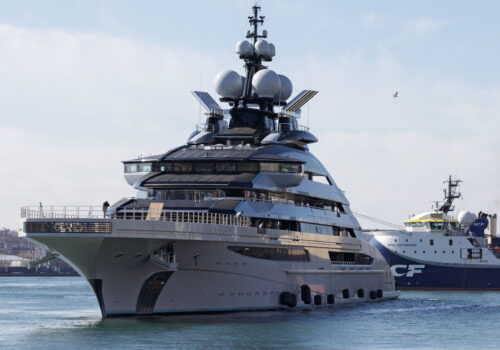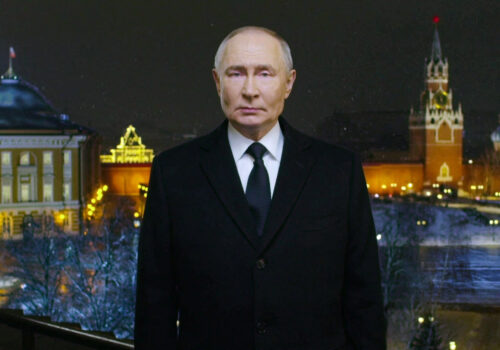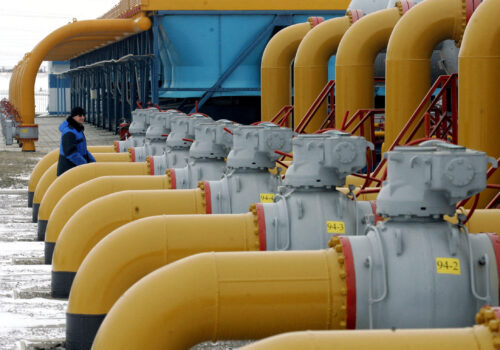Is 2025 the year that Russia’s economy finally freezes up under sanctions?
For nearly three years, Russia has waged its unnecessary and unsuccessful war in Ukraine. Throughout the invasion, Russian forces have destroyed dozens of cities and villages. They have bombed residential areas, cultural centers, schools, places of worship, and other nonmilitary targets. The Russians have displaced one-fourth of Ukraine’s population, and they have killed thousands of Ukrainian citizens. Russia’s military incursion into Ukraine has failed in its initial aim to overrun the country and subjugate its citizens in just a few days, but it has nonetheless been devastating for Ukrainians.
To condemn the Russian Federation for its behavior, the international community has come together to support Ukraine. A primary method of punishment that Ukraine’s partners and friends have pursued against Russia is the implementation of sanctions. Several Russian banks have been removed from SWIFT, the international financial messaging system. Thousands of companies have terminated or suspended business operations in Russia. Hundreds of Russian oligarchs, politicians, and government officials have had their assets frozen or seized, and several countries around the world have reduced their consumption of Russian gas.
Initially, the international community had hoped that sanctions would sharply reduce the value of the ruble and thus bring a swift end to Russia’s war. But this was not to be the case, and the effects of the sanctions were slow. The Russian Federation’s economy contracted by 2.1 percent in 2022 but grew in 2023 and 2024 due to Russia’s decision to increase its defense spending. Meanwhile, the Russians lost billions of dollars due to international sanctions on Russian businesses, gas companies, and trade. Despite these losses, however, the Kremlin has continued its full-scale invasion.
Three years later, the picture looks different. The Russian economy is now beginning to see the full effects of international sanctions. If these trends continue, then the full impact of these financial punishments, combined with strong Ukrainian resistance to Russian forces, could at last put enough pressure on the Kremlin to end its war.
The first signs appeared at the end of 2024. The ruble has weakened, with the Russian currency having lost more than half of its value against the US dollar and the euro, according to a recent analysis by the Kyiv School of Economics. International sanctions on Russian financial institutions played a critical part in this devaluation. In addition, according to the Kyiv School of Economics, Russian oil exports “dropped to $64.40 per barrel” at the end of 2024 (exports were initially $70 per barrel). This suggests that the Russian government is generating less revenue from oil sales.
Rising inflation is causing concerns in Russia, too. In his annual televised question-and-answer session last month, Russian President Vladimir Putin said that inflation is a problem and that the Russian economy is “overheating.” He acknowledged that the price of goods has increased, but he attempted to counter this by saying that wages for Russian citizens have also increased. He then concluded that the Russian Central Bank was working to adjust its benchmark to address rising inflation.
Putin’s points on inflation were telling. The Russian leader seldom discusses problems pertaining to Russian society. Thus, the fact that he felt the need to acknowledge inflation as a serious issue suggests that something greater is afoot.
In addition to the decline in the Russian ruble and rising inflation, there are other causes of concern within Russia. According to the Carnegie Endowment, industrial factories in Russia are operating at only 81 percent capacity. Many of these businesses cite labor shortages as a major reason for the underproduction of goods and materials. The labor shortage is partially caused by the Russian invasion of Ukraine, as hundreds of thousands of Russian men have been conscripted into the Russian military. The promise of signing bonuses to join the military has also enticed still more recruits to join, especially from impoverished areas of Russia. The obvious effect of sending these men to the front is that they no longer can work in Russian factories. Furthermore, Russia has sustained over eight hundred thousand casualties since the start of the war, including both dead and injured. Many of the injured who do come back are unable to return to work in the factories.
As for international business, Russian exports and trade have been significantly impacted. Thousands of Western companies have suspended and terminated their business in Russia, meaning that the country is not generating revenue from these organizations. In addition, several banks have stopped trading with Russia, meaning that the Russian Federation is conducting fewer transactions. Furthermore, the international community is cracking down on companies and businesses that are helping Russia avoid international sanctions. Fear of additional punishments has caused several of these “sanctions busters” to suspend their business and trade with Russia. This has also hurt the Russian economy.
Putin’s obsession with the war in Ukraine has been costly. Throughout the war, the Russian government has spent tens of billions of dollars’ worth on defense equipment and weapons. Russia has also increased its national defense spending to record numbers while slashing spending on other government services, including scientific research. It is not just that direct spending on the war is “unproductive.” The total effect has been to impoverish Russians in other areas of their lives, as well.
Given these developments, perhaps international sanctions are finally working to their full effect. The current signs show that Russia will face an economic recession in 2025, and Putin and the Kremlin will have to determine how to try to address these financial woes.
For now, there is no clear strategy. Many Russians appear concerned about the state of the Russian economy and their well-being, and they likely believe that their wages will not account for rising inflation. This suggests that 2025 will be a difficult year for Russians and the economy. Time will tell how significant these events will be.
Mark Temnycky is a nonresident fellow at the Atlantic Council’s Eurasia Center and an accredited freelance journalist covering Eurasian affairs.
Further reading
Wed, Jan 8, 2025
Sanctioned kleptocracy: How Putin’s kremligarchs have survived the war—and even prospered
Russia Tomorrow By
The latest report in the Atlantic Council’s Russia Tomorrow series explores how Russia’s kleptocratic networks infiltrated the West and measures the US and Europe can take to combat the malign influence of Russian kleptocracy around the globe.
Tue, Jan 7, 2025
Putin begins 2025 confident of victory as war of attrition takes toll on Ukraine
UkraineAlert By
Donald Trump has vowed to end Russia's invasion of Ukraine but Vladimir Putin begins 2025 more confident of victory than ever and with little interest in a negotiated peace deal, writes Mykola Bielieskov.
Mon, Jan 6, 2025
The Russia-Ukraine energy divorce offers a chance for Europe to take control of its energy security
New Atlanticist By Olga Khakova
Ukraine’s closure of a pipeline that supplied Russian gas to Europe offers the European Union an opportunity to enhance its economic and energy security.
Image: The Church of St. George the Victorious on Pskov Hill is seen behind a heap of snow on a cloudy day in Moscow, Russia, December 10, 2024. REUTERS/Maxim Shemetov


